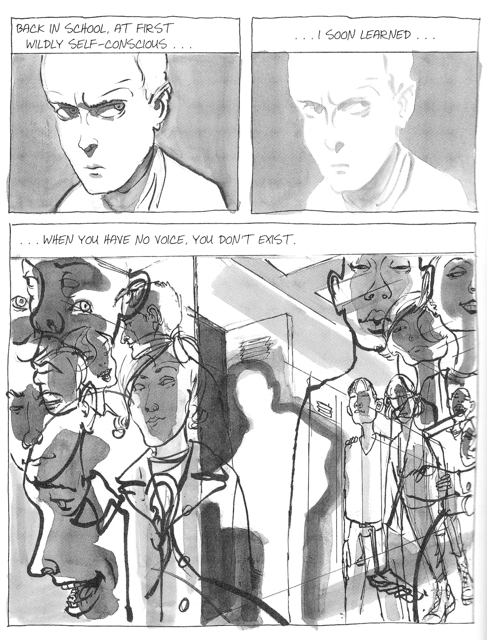
When he was a teenager, David Small was admitted to a hospital and had a growth removed from his neck. He couldn’t speak for a long time afterward, and even then it came out as a whisper. Eventually, through practice and therapy, he would learn to shout and sing and scream. By way of words and pictures he does all of that in Stitches. Here in his memoir, he is finally able to express some things that might otherwise have been left stifled.
I’ve reviewed a lot of horror books in recent months, but this autobiography is scarier than the lot of them. For one, it’s about a child growing up in an inhospitable family environment with parents who leave his questions unanswered. Left to his own devices, young David’s curiosity turns to dread. It’s Calvin & Hobbes in reverse, with a child’s imagination turned from a place of wonder to worry. Small was muted long before he’d lost his physical voice. Open communication was discouraged and an embargo was placed on self expression. Losing his speech was insult compounded on injury.
The section of the story where David learns of his inability to speak is harrowing. We read about injury all the time in narratives, fictional or otherwise. There’s no guarantee we’ll be affected. But when the psychological ramifications of physical trauma are also brought to light, we’re invited to experience hidden terrors. My reading of this story comes little over a month after my grandfather had his own vocal cords surgically removed. While the operation was successful, all cancer banished from his system, he passed away just before Halloween. He was never able to learn new ways to communicate before he died. I think about that loneliness and isolation, especially as a new experience after a lifetime of talking freely. An inalienable right, or so I believed. It didn’t seem fair that one of the people who contributed so lavishly to my own sense of storytelling could no longer utter a word. That he was taken away before he could devise of a new way of saying something, anything. Such thoughts were fresh in my mind when I read of Small’s experience. He recounts nightmares, climbing into his own mouth and pointing down into the nothingness. He vividly portrays the day-to-day realities of his condition, how he’d fade into the background at parties, invisible because he had no voice to contribute to the conversation. To be without a language. That’s genuinely scary.
Small illustrates his young life in tones of black and gray. A gray the color of the spent tap water after finishing a painting. It’s almost constantly bleak, but it isn’t maudlin. He’s just telling it the way it happened, right down to the daydreams. Right down to the big, jarring sound effects as his bitter old grandmother shook the creases from the bed sheets or the tut-tut of his father’s pipe. Right down to the disdainful looks his mother gave him when he asked about the copy of Lolita she burned with the rest of his books. How sometimes you could see the pupils behind the lenses of glasses, but most of the time there was nothing but clinical, uncaring whiteness. All the while everybody’s looming, higher up and looking down. At you, not to you. It makes me even more thankful I never had it so bad, even more aware that there are those that did. Thankful that there are places like books where people can share their stories and speak up for themselves, because it wasn’t always that way.
Paul Montgomery writes about comics from Philadelphia. If you know of any he hasn’t written about and really ought to, let him know. Find him on Twitter or contact him at paul@ifanboy.com.



Very nice review, Paul. It’s evident that this book had a huge impact on you. I’ll most certainly add this to my next order.
As a teacher, I cannot fathom being unable to speak. Speech is so integral to my life that I wouldn’t feel whole if I lost that ability.
This sounds like a truly moving piece. Thank you for bringing it to my attention. I am adding it to my wish list.
And thank you also for sharing that tidbit about your Grandfather. I’ve lost three of my four grandparents over the last few years and it is always nice to know there is someone else out there that has fought through that.
I will have to check this out
I just added myself to the request list for this book through my library. Sounds like a great read. Thanks for passing along this title, Paul.
I’ve had this on my wish list for a while. Hopefully be getting it soon. Good review.
So glad one of you guys read this!
WOW!!!! I want to read it…. Iam having my LCS put this on my pull list this weekend!
Just finished reading this today. It was beautiful and tragic. The moments of his childhood that Small choose to share in this story really create some solid themes. Language, secrets, mental health, communication and family are all touched upon in this book. The art itself is beautiful and I found myself slowing down to really look at it.
Needless to say, I loved it. Thanks for the recommendation, Paul.